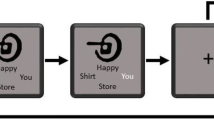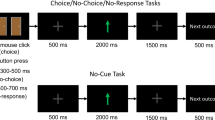Abstract
Two experiments were carried out in which low- and high-demand characteristics of self-reward were assessed in a multiple-baseline design across subjects. In the first experiment, arithmetic performance of four children was systematically assessed under no-reinforcement, self-reward/low-demand and self-reward/high-demand phases. In the second experiment, the performance of four children on a less meaningful task was assessed under the same conditions employed in Experiment 1. Results indicated that performance rates were relatively stable during the no-reinforcement phase but that these rates dropped markedly during the self-reward/low-demand phase for all eight subjects. Further, increased rates of performance were achieved under the self-reward/high-demand phase for all subjects. Results are discussed in terms of the assessment of the self-reinforcement procedure, current definitions of “self-reinforcement,” and the need to view self-reinforcement as existing on a continuum of external demand characteristics.
Similar content being viewed by others
References
Bandura, A., and Perloff, B. Relative efficiency of self-monitored and externally imposed reinforcement systems.Journal of Personality and Social Psychology 1967,7 111–116.
Bass, B. Reinforcement history as a determinant of self-reinforcement.Journal of Psychology 1972,81 195–203.
Bolstad, O. D., and Johnson, S. M. Self-regulation in the modification of disruptive classroom behavior.Journal of Applied Behavior Analysis 1972,5 443–454.
Brownell, K. D., Colletti, G., Ersner-Hershfield, R., Hershfield, S. M., and Wilson, G. T. Self-control in school children: Stringency and leniency in self-determined and externally imposed performance standards.Behavior Therapy 1977,8 442–455.
Drabman, R. S., Spitalnik, R., and O'Leary, K. D.. Teaching self-control to disruptive children.Journal of Abnormal Psychology 1973,82 10–16.
Felixbrod, J. J., and O'Leary, K. D. Effects of reinforcement on children's academic behavior as a function of self-determined and externally-imposed contingencies.Journal of Applied Behavior Analysis 1973,6 241–250.
Felixbrod, J. S., and O'Leary, K. D. Self-determination of academic standards by children.Journal of Educational Psychology 1974,66, 845–850.
Harter, S., and Zigler, E. F. Effectiveness of adult and peer reinforcement on the performance of institutionalized and non-institutionalized retardates.Journal of Abnormal Psychology 1968,73 144–149.
Hersen, M., and Barlow, D. H.Single Case Experimental Designs: Strategies for Studying Behavior Change. New York: Pergamon, 1976.
Jones, R. T. The role of external variables in the self-reinforcement procedure. Invited poster session. The Fifth Annual Convention of the Association of Behavior Analysis, Dearborn, Michigan, June 1979.
Jones, R. T. The role of external variables in self-reinforcement.American Psychologist 1980,35 1002–1004.
Jones, R. T., and Evans, H. Self-reinforcement: A continuum of external cues.Journal of Educational Psychology, 1980, in press.
Jones, R. T., Nelson, R. E., and Kazdin, A. E. The role of external variables in self-reinforcement: A review.Behavior Modification 1977,1 147–178.
Mahoney, M. J., and Arnkoff, D. B. Cognitive and self-control therapies. In S. L. Garfield and A. E. Bergin (Eds.),Hoodbook of Psychotherapy and Behavior Change. New York: Wiley, 1979.
Masters, J. C., and Mokros, J. R. Self-reinforcement processes in children. In H. W. Reese (Ed.),Advances in Child Development and Behavior. Vol. 9. New York: Academic Press, 1974.
Meichenbaum, D. Teaching children self-control. In B. B. Lahey and A. E. Kazdin (eds.),Advances in Clinical Child Psychology. New York: Plenum Press, 1979.
Morgan, W. G., and Bass, B. A. Self-control through self-mediated rewards. Paper presented at the Fifth Annual Meeting of the Association for the Advancement of Behavior Therapy, Washington, D.C., September 1971.
Ollendick, T. H. Self-monitoring and self-administered over-correction in the modification of nervous tics in children.Behavior Modification, 1980, in press.
Rachlin, H. Self-control.Behaviorism 1974,2 94–107.
Spates, C. R., and Kanfer, F. H. Self-monitoring, self-monitoring, self-evaluation, and self-reinforcement in children's learning: A test of multistage self-regulation model.Behavior Therapy 1977,8 9–16.
Stevenson, H. W., Keen, R., and Knights, R. M. Parents and strangers as reinforcing agents for children's performance.Journal of Abnormal and Social Psychology 1963,67 183–186.
Stuart, R. B. Situational versus self-control. In R. D. Rubin, H. Fensterheim, J. D. Henderson, and L. P. Ullmann (Eds.),Advances in Behavior Therapy. New York: Academic Press, 1972, pp. 129–146.
Thoresen, C. E., and Mahoney, M. J.Behavioral Self-Control. New York: Holt, Reinehart and Winston, 1974.
Winston, A. S., Torney, D., and Labbee, P. Children's self-reinforcement: Some evidence of maximization of payoff and minimization of effort.Child Development 1978,49 882–884.
Author information
Authors and Affiliations
Additional information
This project was supported in whole by a faculty research grant awarded to the first author and completed while the second author was a visiting associate professor at Western Psychiatric Institute and Clinic.
Rights and permissions
About this article
Cite this article
Jones, R.T., Ollendick, T.H. Self-reinforcement: An assessment of external influences. Journal of Behavioral Assessment 1, 289–303 (1979). https://doi.org/10.1007/BF01321371
Accepted:
Issue Date:
DOI: https://doi.org/10.1007/BF01321371




